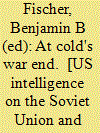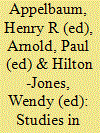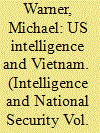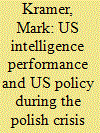| Srl | Item |
| 1 |
ID:
049663


|
|
|
|
|
| Publication |
U.S.A, Central Intelligence Agency, 1999.
|
| Description |
ix, 378p.
|
| Standard Number |
1929667027
|
|
|
|
|
|
|
|
|
|
|
|
Copies: C:1/I:0,R:0,Q:0
Circulation
| Accession# | Call# | Current Location | Status | Policy | Location |
| 042309 | 327.1273/FIS 042309 | Main | On Shelf | General | |
|
|
|
|
| 2 |
ID:
084735


|
|
|
| 3 |
ID:
047704


|
|
|
|
|
| Publication |
Washington,D C, Center for the Study of Intelligence, 2000.
|
| Description |
iv, 107p.
|
|
|
|
|
|
|
|
|
|
|
|
Copies: C:2/I:0,R:0,Q:0
Circulation
| Accession# | Call# | Current Location | Status | Policy | Location |
| 042710 | 327.12/APP 042710 | Main | On Shelf | General | |
| 043679 | 327.12/APP 043679 | Main | On Shelf | General | |
|
|
|
|
| 4 |
ID:
101125


|
|
|
|
|
| Publication |
2010.
|
| Summary/Abstract |
Recent declassifications of the official histories of Central Intelligence Agency and National Security Agency activities in the Vietnam War give historians a sharper outline of the overall American intelligence effort in that conflict and a trove of supporting details. While scholars will have to use the new releases with caution, the histories (when combined with appraisals from the Armed Services) offer glimpses of the scale of the US intelligence program and some of the complications that hindered its effectiveness. Two particular features stand out when these materials are viewed in conjunction: the disconnectedness of the various agencies' and Services' efforts from each other (and from decision makers in Washington); and the difficulties that all of them had in working with America's South Vietnamese allies. The picture emerging is thus one of a congeries of largely independent intelligence campaigns working simultaneously against the North Vietnamese and Viet Cong targets. Intelligence miscues did not lose the Vietnam War for the Americans and South Vietnamese, but it now seems clearer that they made victory less likely.
|
|
|
|
|
|
|
|
|
|
|
|
|
|
|
|
| 5 |
ID:
097259


|
|
|
|
|
| Publication |
2010.
|
| Summary/Abstract |
US intelligence activities have changed in recent years because of changing global political conditions. Using sophisticated technologies, intelligence agencies now conduct surveillance of a wide variety of organizations and an enormous number of people, including many US citizens. This has generated a vast amount of data that these agencies have not been able to use productively, in spite of the expenditure of many billions of dollars, mostly with private firms. Some 70 percent of the approximately $75 billion spent on intelligence annually is spent on these firms. The author discusses a number of serious problems with these developments.
|
|
|
|
|
|
|
|
|
|
|
|
|
|
|
|
| 6 |
ID:
106603


|
|
|
|
|
| Publication |
2011.
|
| Summary/Abstract |
Drawing on intelligence documents that were recently declassified, this article assesses the quality of US intelligence analysis during the 1980-81 Polish crisis and the impact of the intelligence analysis on US policy toward Poland and the Soviet Union. After discussing the value and limitations of the declassified materials, the article raises questions about US policy during the crisis and discusses how intelligence inputs helped to shape policy. The newly available documents confirm that the US intelligence community's analytical products were often deficient and that these shortcomings put a crimp on US policymakers' choices.
|
|
|
|
|
|
|
|
|
|
|
|
|
|
|
|